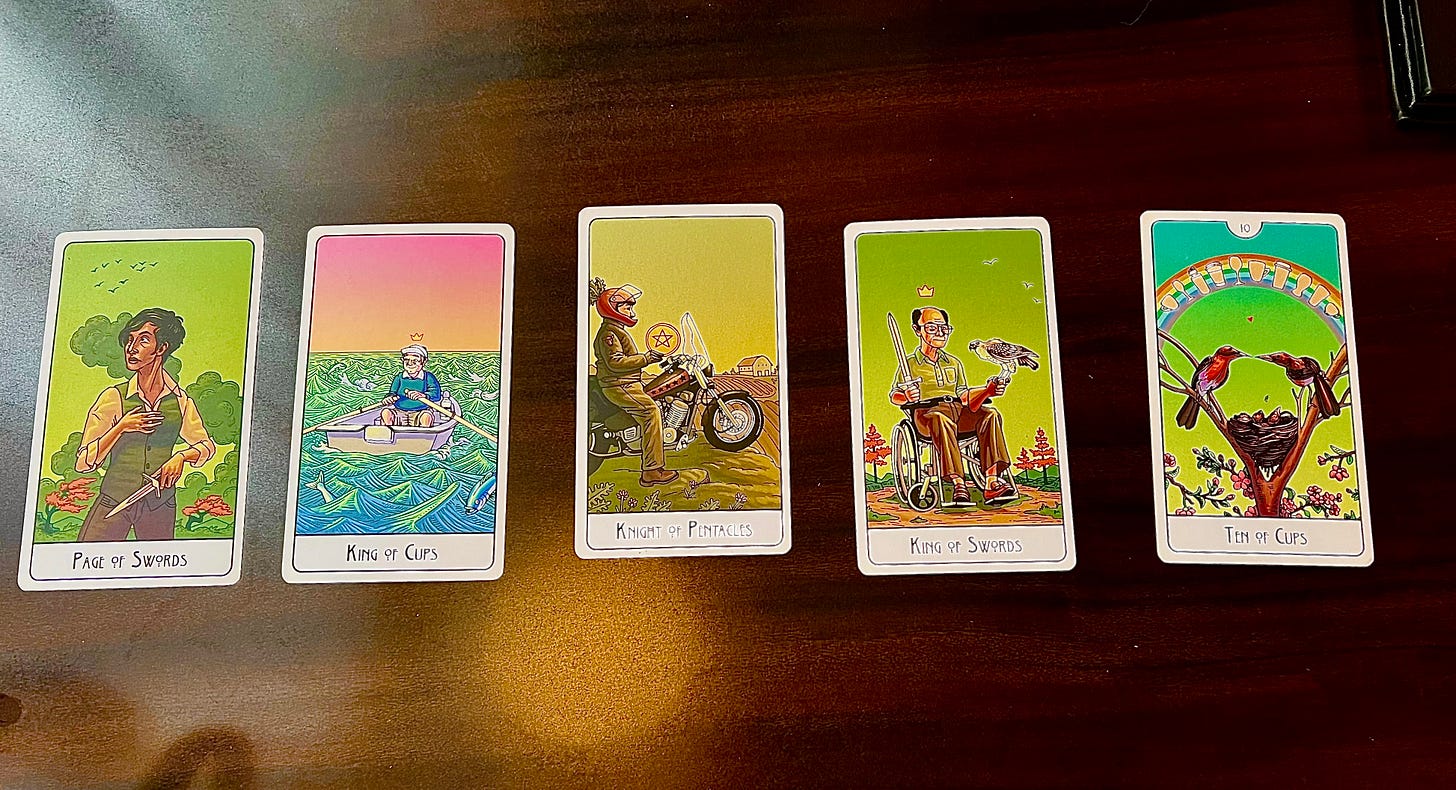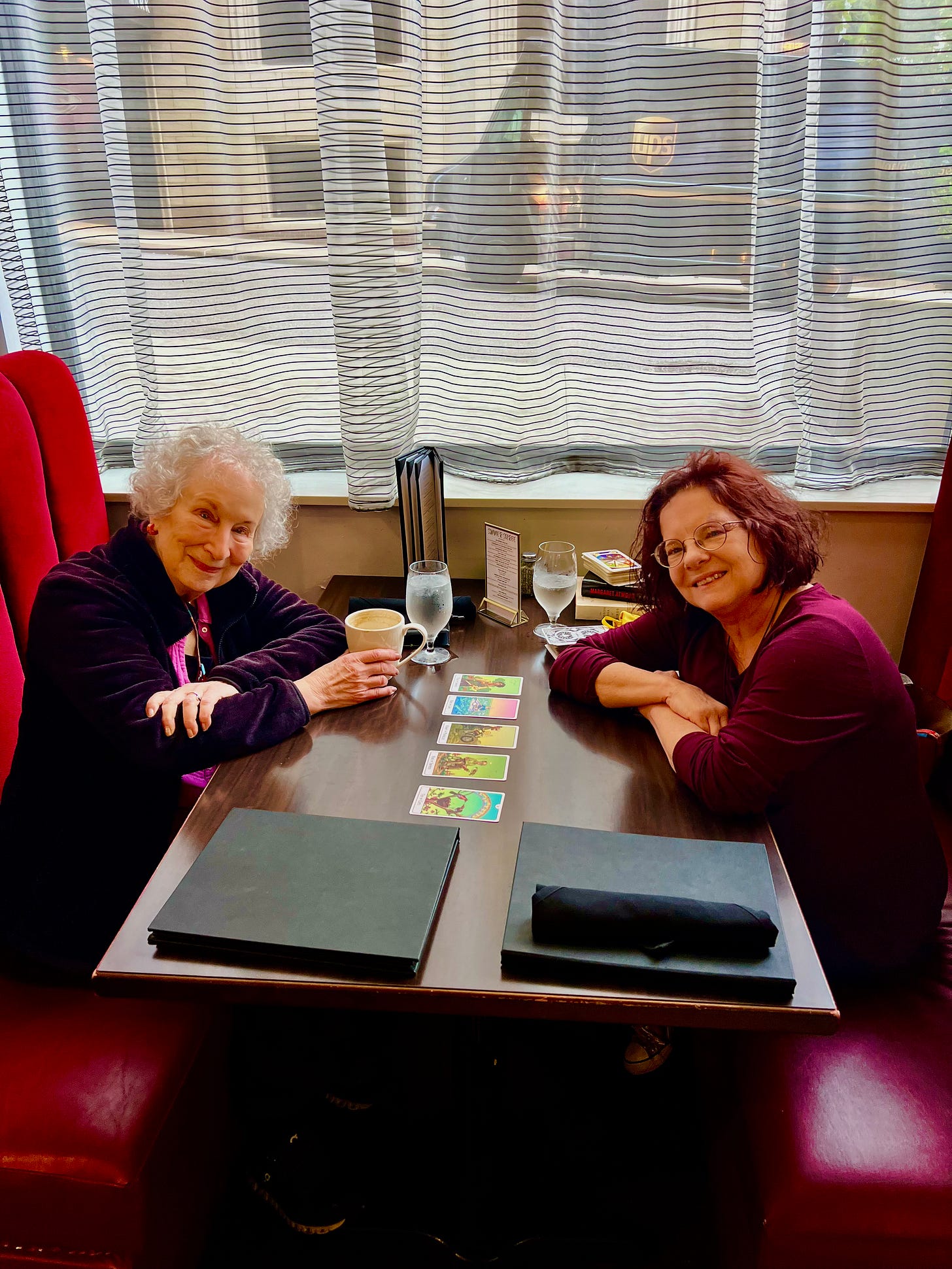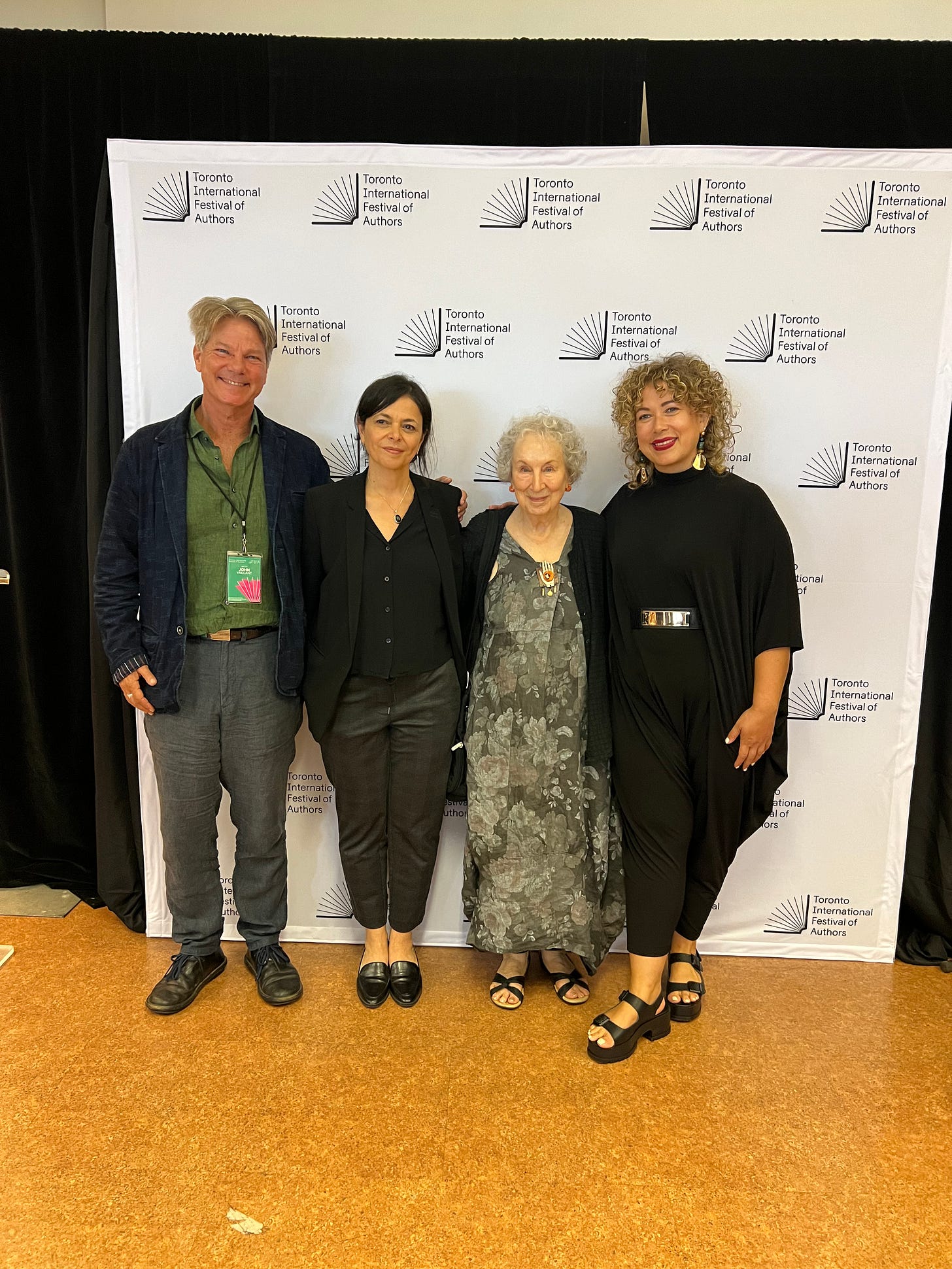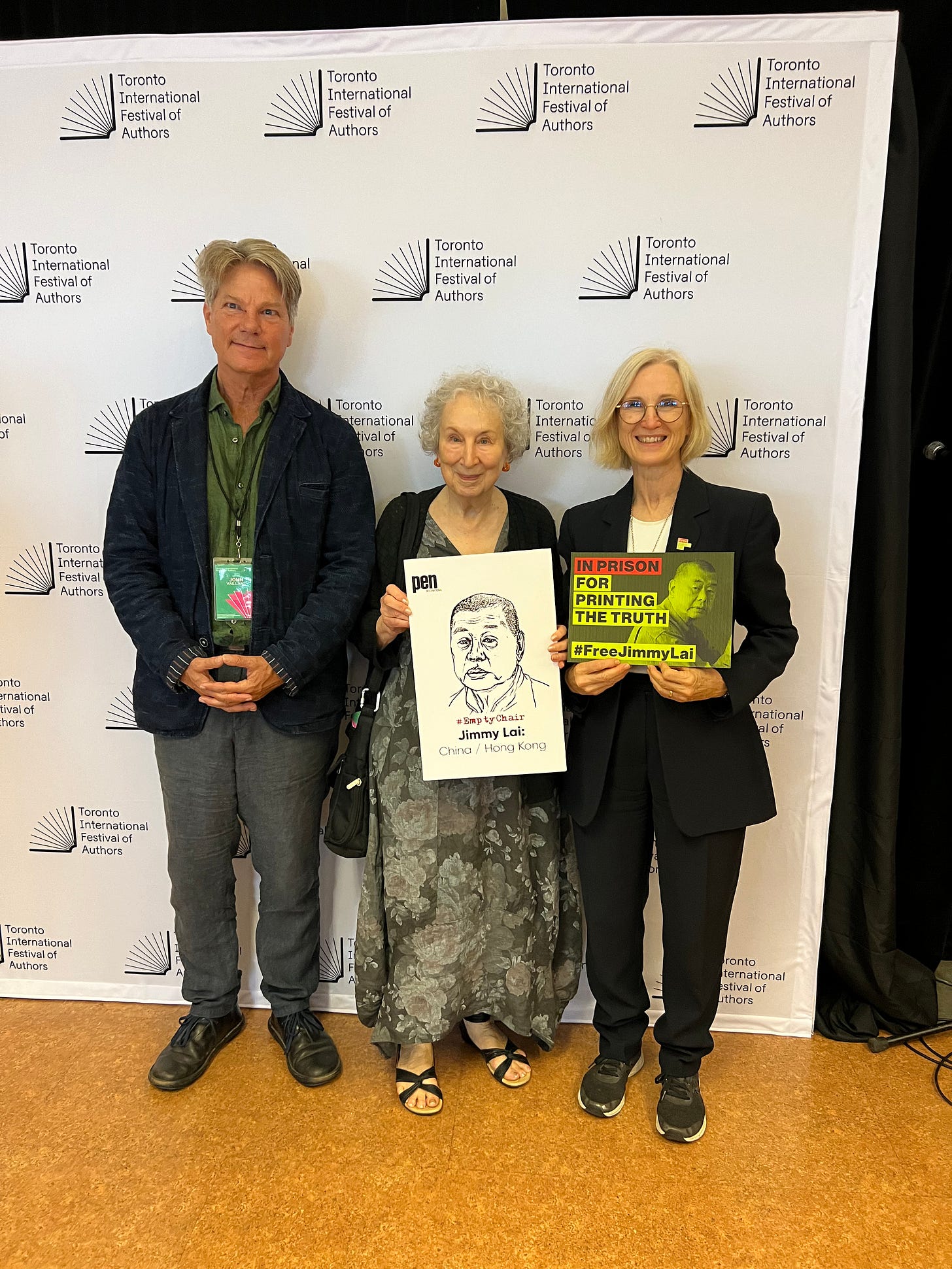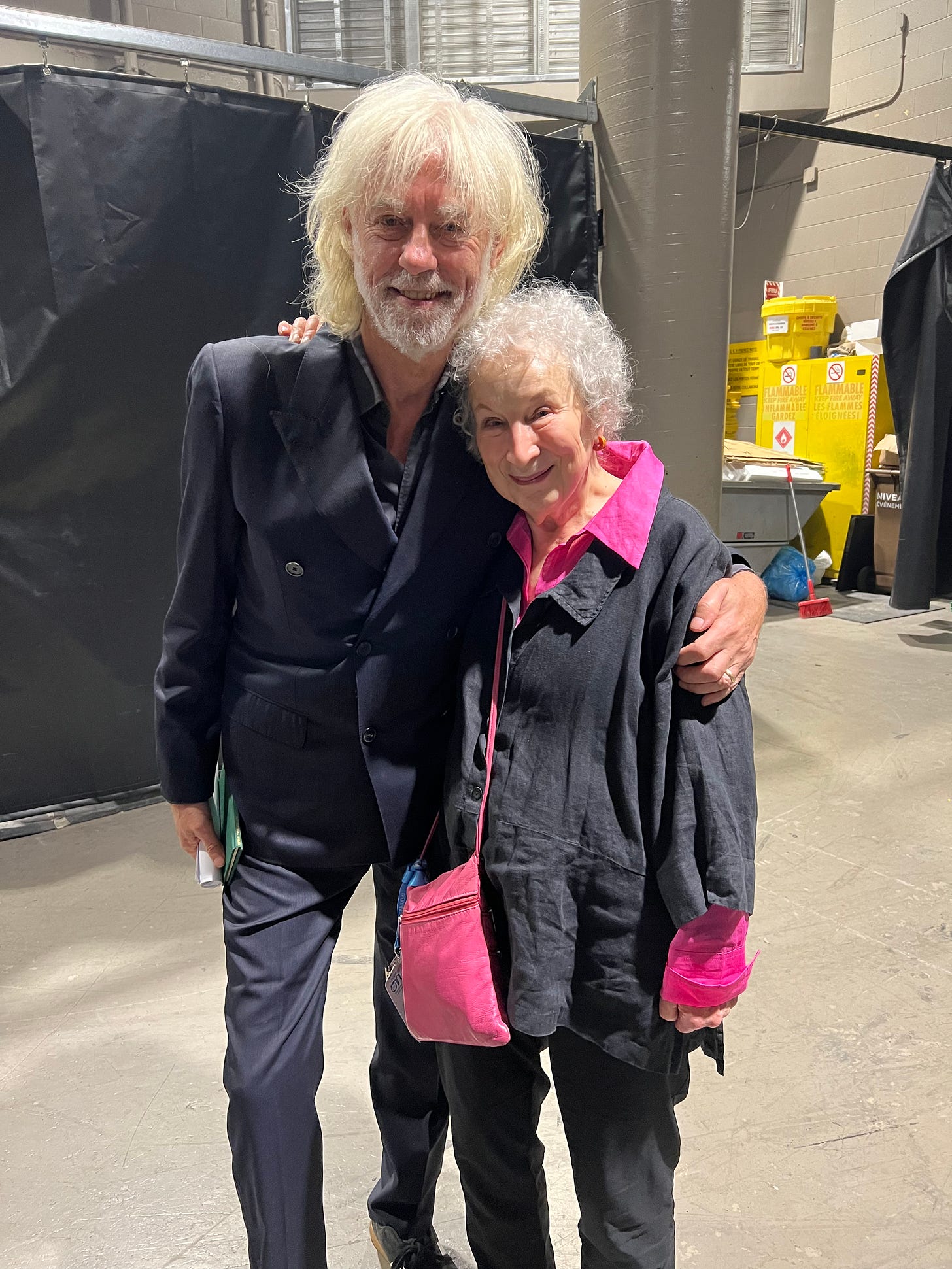I’ve been an Unreliable Narrator.
No, not in a novel: on this Substack. Like a Victorian child who’s been naughty and made to stand in the corner, I weep tears of contrition and promise to do better in future. However, like Toad of Toad Hall’s vows of moral improvement, it’s a promise I won’t necessarily keep. That is the nature of old ladies driving motorbikes.
. The card reading was done by the effervescent Kaite Stover of the Kansas City (MO) Library, where I just popped in for their 150th anniversary — imagine that! And where they were doing an anti-book-banning campaign. And asking me lots of questions. What fun we had! (The deck, by the way, is called This Might Hurt. I’m getting one.)
Here we are with cards laid out:
Just before that, it was the weekend of the PEN Graeme Gibson Talk at the International Festival of Authors, sponsored by PRH Canada and now in its fourth year. The subject was Burning Questions: Confronting the Challenges of our Global Climate Crisis. Our guests were John Vaillant, author of the terrifying Fire Weather: The Making of a Beast, and Catherine Abreu, Director of the International Climate Politics Hub, among many other things. Our moderator was the multi-talented Nalah Ayed of CBC Ideas — on which this event will later be broadcast — who has just published the best-selling The War We Won Apart: The Untold Story of Two Elite Agents Who Became One of the Most Decorated Couples of WW2, which I am about to read.
Here we are, all in a row:
And here are John Vaillant, me, and Grace Westcott, Chair of PEN Canada, with our Empty Chair writer on whose behalf PEN Canada is advocating. (Donate at: https://pencanada.ca/act/donations/)
I was the introducer. Here is what I said:
GRAEME GIBSON PEN CANADA TALK, INTRO.
Hello:
I’m Margaret Atwood, and I’m very excited to be introducing this afternoon’s Festival of Authors event, the fourth annual PEN CANADA Graeme Gibson Talk: Burning Questions: Confronting the Challenges of our Global Climate Crisis.
It’s a very appropriate title for the Graeme Gibson Talk, as Graeme was a dedicated conservationist. Beginning with his conversion to birdwatching in the 1960s, Graeme had been increasingly concerned not only with the threat of mass species extinction, but also with the fate of the entire biosphere. He spent over ten years writing the highly popular Bedside Book of Birds; he served on several bio-organizations, from the large – BirdLife International, the oldest and biggest and most international conservation organization in the world – to the small – the Pelee Island Bird Observatory in Lake Erie, stopping point for a huge number of birds during spring and fall migrations, of which Graeme was a co-founder. He introduced birding trips to Cuba in the 1980s—it took him two years to convince the Cuban government that we would not all be spies, despite our binoculars, and also that people would actually pay money to be devoured by gnats while pursuing anything with feathers. I can testify to his zeal, having almost frozen to death (snowy owl, Amherst Island) and drowned (Scarlet Ibis, Trinidad) and gone over the edge of a cliff in a car in a thunderstorm in the dark (Resplendent Quetzal, Costa Rica).
Climate change and the turmoil it’s bringing is an uncomfortable topic – no one wants to contemplate a planet without life, including that of our own species. It’s not restful, and can get wearing at the dinner table. “Can we maybe talk about something besides burning up and killing everything?” I might remark. But as Graeme knew, avoiding a subject doesn’t make it go away. The climate crisis is something we have to deal with, or we’re cooked. Literally.
Our three panelists today could not be more qualified to horrify and, we hope, to inspire us.
John Vaillant’s latest Number One bestseller, Fire Weather: The Making of a Beast – is about the catastrophic 2016 wildfire in Fort MacMurray, hub of Canada’s oil industry.
The multi-billion-dollar disaster melted vehicles, turned entire neighborhoods into firebombs, and drove 88,000 people from their homes in a single afternoon. Fire Weather warns us that this may be the new normal in the hotter world we have helped to create.
Catherine Abreu an internationally recognized, award-winning climate justice advocate with 15 years of experience in the heart of the global climate movement. She is the Director of the International Climate Politics Hub, a global network accelerating climate action, and has been named 2023’s National Hero by Canada’s Walk of Fame. She is one of 14 appointed members of Canada's Net-Zero Advisory Body, and is an advisor to the Canadian Climate Institute, among other positions. Her expertise makes her a vital figure in climate policy and action, shaping global discussions on the transition toward clean energy.
Moderator Nahlah Ayed is an award-winning writer, broadcaster, and the host of CBC’s Ideas. For two decades, she worked in war zones wars -- Afghanistan and Iraq, Russia’s invasion of Crimea. Her most recent book, The War We Won Apart, was recently published and has become a huge bestseller. It chronicles the love story of two elite agents, one Canadian, one British, who became one of the most decorated couples of WWII. As I’m one of the few left who were actually alive in those times, I can hardly wait to read it. Letters! On paper! Remember those?
Graeme would have been highly delighted, both by this topic and by our panelists. Please welcome John Valliant, Catherine Abreu, and Nalah Ayed.
Right before that I was in Montreal at the One Young World Congress, with youthful leaders from all over the planet. Here I am with the ever-youthful Sir Bob Geldorf of music fame, an early founder of One Young World. (You can tell it’s the Life of Glamour because of the backstage mop and trash containers. The Life of Glamour always has those.)
Two foxy old cotton-tops who won’t quit
Sir Bob, the reknowned and also non-quitting David Suzuki, and I (in reverse order) were the final speakers of the opening event, representing — I think — Wise Older Counsellors, or else The Three Fates. Here is what I said:
ONE YOUNG WORLD
Good evening. I’m Margaret Atwood, and I write books. Some people consider these books to be gloomy dystopias, but I think they’re quite optimistic, as I haven’t yet killed off every single character in them. That’s looking on the bright side.
However, I’m a bit surprised to find myself at a gathering called One Young World. I’m older than Donald Trump! (And better looking.) I’m older than Joe Biden! I was about to say “combined,” but that wouldn’t be quite true. Yet.
It’s an honour to be here with such an impressive bunch of young people! You’re all so filled with energy! One day you will have to take naps after lunch. So, cherish the moment.
But what a difficult moment we are living in right now. The astrologers will tell you the stars have not aligned like this since the French Revolution. That wasn’t a whole lot of fun, what with the guillotines and mass drownings, though the ideas many of us cherish today – liberty, equality, sorority, a free press, democratic elections, and violent bloodthirsty public spectacles such as football – began right there.
Every human invention and ideology is a three-sided knife: the good side, the bad side, and the stupid side you didn’t anticipate. As every planner and inventor and policy wonk knows, part of the job is to ask yourself: What could go wrong? Often, quite a few things. Dare I whisper the words “plastic” and “social media”? The first is in your blood stream right now, the second is addling your brain, not to mention your kids’ brains. Is there a good side to either of them? Yes. It will be your task to accentuate the positive and eliminate the negative. Though that’s easier said than done.
However – I bring a message to you from a planet far, far away and in another time – namely, the past. That message is: Cheer up, it’s been worse. Once, there were no avocadoes in North America. Once, children were taught to duck under their school desks in case of an atomic bomb attack. Once, there was a world war that involved over seventy countries and every continent except Antarctica, and killed an estimated 80 million people. Once, deadly plagues swept the earth – the bubonic plague that killed half the population of Europe, the European diseases that wiped out an estimated 80 percent of the populations of North and South America, the 1918-1919 flu that killed 50 million people, its victims dying within hours while bleeding from the ears. But so far, the human race has come through it all. And you can, too.
Your generation has many of the old kinds of problems – wars, economic inequalities, social disruptions, authoritarian regimes -- but you have some new ones, as well. The worst new one is climate change. It has brought with it a whole lot of other changes: whirlwind wildfires, floods, soil erosion, violent winds, droughts, bad harvests, and – driven by all these things -- human migration on a vast scale. These conditions are deeply unsettling. But as my mother used to say, “Roll up your sleeves.” That meant there was work to be done.
What kind of work must be done? Many kinds, but all are works of renewal, and all involve changing the way we see and imagine our lives. How do we segue from fossil fuels to renewables without causing riots and warlords? How do we restore damaged soil, degraded forests, trashed ecosystems, overfished and plastic-clogged oceans, poisoned fresh waters? How do we safeguard the living species on this planet, including our own?
There are many solutions already underway. We’re now seeing marine parks that increase fish numbers, mushrooms that eat plastics, and organic fibers made from such substances as sea algae, bamboo, and bananas. Printable houses can now be made in a couple of days. Plastic waste is being recycled into building boards and fabrics. New fuels such as hydrogen are being developed. Low-carbon heating and cooling and energy technologies. More productive and less toxic ways of growing food. And – why not? – new foods. Who ever heard of chia seeds in 1955?
You yourselves will know of many more initiatives. But to be effective, new materials and methods must have three things in common.
First, the innovations must have lower carbon emissions than what they replace. Second, they must be cheap enough to be scalable – so that many, many people will be able to deploy them. And third, they must be attractive enough so people will want to actually use them. Looking good and tasting good are built-in human must-haves.
I will add a fourth thing: these solutions and their deployment must be international. Yes, all beneficial actions must be local and grounded – ideas alone are ineffective unless they can be become part of real peoples’ lives – but there must be enough local uses to make a difference. And there must be enough benefit for local people – otherwise they won’t bother, and why should they? Among the most effective conservation efforts have been those led by Indigenous peoples – they are motivated to care for their homelands, and they have the up-close knowledge to do so.
The final consideration is this: international co-operation will be key. No one can do this alone. Inspiring visionaries, scientists, inventors, entrepreneurs, funders, policy makers, on-the-ground organizers, and yes, even AI data analysts– this is a jigsaw puzzle with a great many pieces.
But you’ve got the energy and optimism to take on the challenge: otherwise, you wouldn’t be here.
I’m very much looking forward to seeing what you’ll come up with. My final three words to you are: Go. For. It.
So there you have it. Zoom-zoom on the mororbike. Coming up soon: More French Revolution — you can see I worked it into the OYW speech — and also, in answer to your many questions, my take on the (ahem) American election, not that anyone’s thinking about That.
It may be more than one take. Women, for instance. Power struggles and purges, for instance. Revenge, for instance.
Thanks for putting up with my periodic absences — I was off dancing widdershins in the garden and cooking up potions, in addition to tuning up my motorbike — but I’ll be back here very soon.
Maybe even tomorrow.
Keep reading with a 7-day free trial
Subscribe to In the Writing Burrow to keep reading this post and get 7 days of free access to the full post archives.




